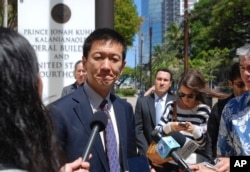Arguments on President Donald Trump's executive order restricting travel will be heard in appeals court Monday.
The order, which bars entry of foreign nationals from six Muslim countries for 90 days and refugees for 120 days, has been on hold since March when two lower courts, one in Hawaii and one in Maryland, issued stays.
The U.S. government appealed both cases, one to the Fourth Circuit Court of Appeals and one to the Ninth Circuit.
The Fourth Circuit will hear arguments Monday. Here is what you can expect:
The arguments
The U.S. government is appealing U.S. District Judge Theodore Chuang’s March 15 ruling in Maryland that granted a nationwide preliminary injunction on the part of the travel order banning entry of foreign nationals from six Muslim-majority countries for 90 days.
Lawyers for the government argue the ban is necessary for U.S. security
Plaintiffs — several refugee rights groups — say the order amounts to a “Muslim ban," something Trump talked about repeatedly when he was running for president.
The court
Travel order case heard “en banc” before a panel of all judges of the Fourth Circuit Court of Appeals (covers Maryland, North Carolina, South Carolina, Virginia and West Virginia)
Each side gets half an hour to argue its case; additional time for judges’ questions questioning.
Most initial hearings are held before three-judge panels. En banc is rare.
There are 15 active judges on the Fourth Circuit; at least two have recused themselves.
Ten of the remaining 13 judges were appointed by Democrats.
After the hearing
An immediate ruling is unlikely
The Ninth Circuit will hold a hearing next week on a lower court order blocking two parts of the travel order: the 90-day ban against nationals from six Muslim majority countries and the 120-day refugee ban.
If one of the circuit courts rules for the government, the travel ban would remain blocked because a circuit court does not supersede a district court from a different jurisdiction.
Conflicting district court decisions could push the case to the U.S. Supreme Court more quickly.















